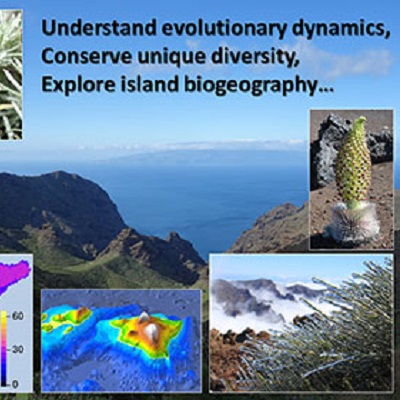Evolutionary dynamics in changing environments: oceanic islands as natural experiments

Oceanic islands provide replicated ‘natural experiments’ that can be harnessed to disentangle general evolutionary patterns from unique evolutionary outcomes. In particular, high-altitude oceanic islands provide good opportunities for such research because they contain large climatic variation in small areas (little within-island dispersal limitation), and because they contain many endemic species, most having evolved in situ on their islands. These endemics are usually considered specialist, with small environmental niches and disproportionately represented on IUCN red lists. However, many may be generalists that have not escaped the geographic filter of island isolation.
This project aims to use island data to test alternative evolutionary models, speciation by niche packing versus speciation by isolation, by contrasting their predictions. Two complementary approaches will compare specialisation between in situ-evolved endemics and native non-endemics: in terms of (1) interaction partners using data from 18 pollination networks across 7 oceanic archipelagos, and (2) environmental niche widths using multi-dimensional hypervolume estimations.
All the data needed for the project have been amassed by the supervisory team and collaborators, though the student will do targeted fieldwork and field visits. Analysis and manuscript writing will therefore proceed quickly. The student will work with a collaborative supervisory team, comprising biogeographers and ecologists from Nottingham (Geography) and Aarhus University (Denmark). The project will involve intensive training in analytical and research-communication skills, and placements with collaborators overseas (Denmark, Germany, Canaries, Azores, Hawaii), exposing the student to varied ideas and perspectives, and developing networking, assimilation and teamworking skills.
The applicant should be willing to spend time overseas, working for short periods (2 weeks to 2 months) with international collaborators, to develop ideas and pursue joint research, and to learn advanced statistical analysis and modelling techniques.
Experience with R would be an asset, but enthusiasm for collaborative research using large secondary datasets is the most important prerequisite.
Applicants should hold a minimum of a UK Honours degree at 2:1 level, or equivalent, in a subject such as Biology, Ecology, Physical Geography, Environmental Science or Natural Sciences.
For further details please contact Dr Richard Field (richard.field@nottingham.ac.uk).
